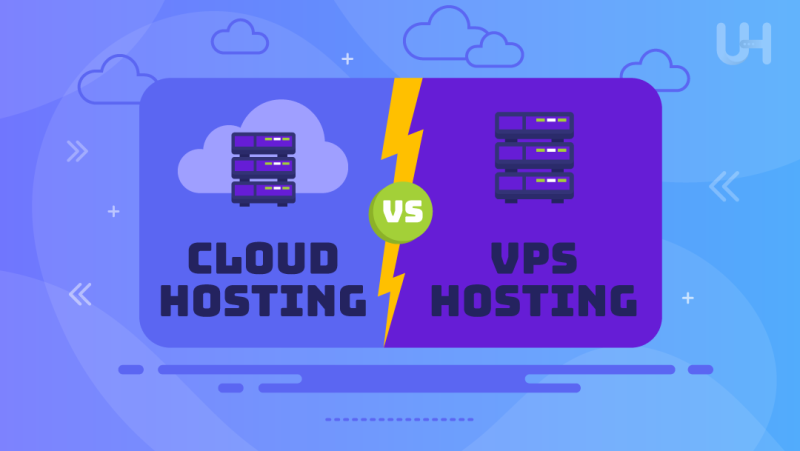Selecting the right hosting solution is like choosing the perfect foundation for your online presence. Cloud Hosting and VPS Hosting are two prominent choices, each offering distinct advantages tailored to different business needs and growth strategies. Understanding the ins and outs of Cloud vs VPS Hosting can make a big difference in how efficiently and cost-effectively your business runs online.
In this article, we’ll break down the key features, pros and cons, security aspects, and management needs of both Cloud and VPS Hosting. By the end, you’ll have a clear idea of which option best fits your business goals and technical requirements. Let’s dive in and find the best digital home for your business!
Understanding Cloud Hosting
Cloud hosting is a type of web hosting that leverages a network of interconnected servers to deliver resources for websites and applications. Unlike traditional web hosting, which depends on a single server, cloud hosting utilizes multiple servers working together as a cohesive system to provide superior reliability, scalability, and performance.
How it works: In cloud hosting, resources such as CPU, RAM and storage are spread across several servers, forming a “cloud.” This setup offers redundancy and ensures high availability. If one server in the network experiences a problem, the workload is automatically redistributed to other servers, minimizing downtime and maintaining seamless performance. This redundancy also provides robust failover protection, so your website remains operational even if a server fails.
Scalability is another significant advantage of cloud hosting. Resources can be dynamically allocated to meet changing demands. For instance, during traffic spikes, additional resources can be provisioned automatically to handle the increased load, and once the demand decreases, resources can be scaled back, optimizing costs. This flexibility makes cloud hosting ideal for businesses with variable traffic patterns, growing websites with scalable website hosting, or applications requiring high availability.
Key Features of Cloud Hosting
- Elasticity and Flexibility: Cloud Hosting allows for dynamic scaling of resources, ensuring optimal performance and cost-efficiency. Businesses can ramp up resources during high-demand periods and scale down during quieter times, optimizing resource utilization and reducing operational costs.
- User-Friendly Management: Cloud Hosting providers typically offer management services and intuitive interfaces that simplify resource provisioning, monitoring, and scaling operations. These user-friendly tools enable businesses to manage their cloud infrastructure efficiently without requiring extensive technical expertise.
- High Availability and Redundancy: Cloud Hosting providers deploy redundant systems across multiple data centers, ensuring high availability and resilience against hardware failures or unexpected disruptions. Automated failover mechanisms and load balancing techniques further enhance reliability and maintain service continuity.
- Global Reach and Geographic Redundancy: With servers distributed globally, Cloud Hosting facilitates low-latency access to applications and data from various geographic locations. Geographic redundancy ensures data availability and disaster recovery capabilities, supporting business continuity and international expansion.
- Scalability Across Services: Cloud Hosting extends scalability beyond computing resources to include additional services such as databases, storage, and networking. Businesses can scale multiple aspects of their infrastructure concurrently, adapting to evolving business needs and market demands.
- Security Measures: Cloud Hosting providers implement robust security measures, including data encryption, access controls, and compliance certifications (e.g., GDPR, HIPAA). These measures ensure data confidentiality, integrity, and regulatory compliance, addressing security concerns and protecting sensitive information.
Elevate Your Hosting with Cloud VPS Hosting
Whether you’re a business seeking reliability or an individual embarking on an online venture, our Cloud VPS Hosting solutions offer both Windows and Linux operating systems with the power and flexibility you need.
Understanding VPS Hosting
VPS hosting stands for Virtual Private Server hosting. It provides a middle ground between shared hosting and dedicated hosting by offering a dedicated segment of a physical server through virtualization technology.
How it works: In VPS hosting, a single physical server is divided into multiple virtual servers using a hypervisor, which creates isolated environments. Each virtual server functions independently and has its own dedicated resources, such as CPU, RAM, and storage. These resources are not shared with other VPS users on the same physical server, ensuring consistent and reliable performance.
One of the key benefits of VPS hosting is the level of control it offers. Users have root access to their virtual server, allowing them to install and configure software, run custom applications, and manage server settings as if they had a dedicated server. This level of control is particularly beneficial for developers, businesses with specific technical requirements, and those needing custom software configurations.
While VPS hosting does offer scalability, it is more limited compared to cloud hosting. To increase resources, users might need to upgrade their plan or migrate to a different server, which could involve some downtime and manual intervention. However, for websites with steady traffic, predictable resource needs, and a desire for dedicated resources at a lower cost than a dedicated server, VPS hosting is an excellent choice.
Key Features of VPS Hosting
- Control and Customization: Businesses have full administrative access to their virtual server, allowing them to install and configure applications, manage security settings, and customize server configurations according to their specific needs.
- Predictable Performance and Cost-Efficiency: VPS Hosting offers dedicated resources that ensure consistent performance. Unlike shared web hosting, where resources are shared among multiple users, VPS Hosting guarantees allocated resources (CPU, RAM, storage) for each virtual server.
- Enhanced Security Measures: VPS Hosting providers offer robust security measures, including firewall protection, affordable SSL certificates, and customizable security policies. Businesses can implement stringent security measures to protect sensitive data and ensure compliance with industry regulations. This level of security is crucial for businesses handling confidential information or running critical applications.
- Scalability within Resource Limits: While not as flexible as cloud environments, VPS Hosting allows businesses to scale resources within the limits of their chosen plan. Upgrading to a higher-tier VPS plan provides additional resources as needed, accommodating growth without the complexities of migrating to a different hosting environment.
- Support for Resource-Intensive Applications: VPS Hosting is suitable for resource-intensive applications and websites that require more power than shared hosting can provide. It offers a balance between cost-effective hosting and the performance benefits of dedicated resources, making it ideal for medium-sized businesses, web developers, and organizations running critical applications.
- Reliability and Uptime Guarantees: VPS Hosting providers typically offer uptime guarantees and service level agreements (SLAs) to ensure reliable service availability. This reliability is critical for businesses that rely on their website or applications to maintain continuous operation and user accessibility.
Ready to Choose the Right Hosting Solution?
Explore affordable VPS hosting options that offer dedicated resources, enhanced security, and full control. Start today and experience the benefits of reliable, high-performance hosting. Get Started with VPS Hosting at Ultahost!
Cloud Hosting Architecture
Cloud hosting operates on a distributed network of interconnected servers that collectively provide resources to host websites and applications. This setup eliminates reliance on a single physical server, offering robustness and scalability. Data redundancy is a core feature, ensuring that information is replicated across multiple servers and data centers. This redundancy not only enhances data security but also minimizes downtime by enabling rapid failover in case of server failures or maintenance.
Load balancing further optimizes performance by evenly distributing incoming traffic across available servers. This dynamic allocation of resources ensures that no single server becomes overloaded, maintaining high availability and responsiveness for users accessing the hosted services. Overall, cloud hosting architecture is designed to support businesses with fluctuating traffic demands and a need for scalable, reliable, and resilient hosting solutions.
VPS Hosting Architecture
In contrast to cloud hosting’s distributed model, VPS (Virtual Private Server) hosting partitions a single physical server into multiple isolated virtual machines (VMs), each functioning as an independent server environment. Each VM within a VPS setup enjoys dedicated resources such as CPU, RAM, and storage allocated from the host server. This architecture provides users with greater control and customization options compared to shared hosting, without the cost of a dedicated physical server.
Virtualization technologies like KVM (Kernel-based Virtual Machine), Xen, and OpenVZ enable the creation and management of these virtual environments. KVM offers full virtualization with strong security and performance capabilities, suitable for diverse operating systems and applications. Xen provides robust isolation and supports both paravirtualization and hardware-assisted virtualization, making it popular in enterprise settings. OpenVZ, on the other hand, utilizes container-based virtualization, sharing a single kernel among multiple containers for efficient resource utilization and quick deployment. VPS hosting architecture thus caters to users needing scalable, customizable hosting solutions with enhanced control over their server environment.
Key Differences Between Cloud and VPS Hosting
Choosing between Cloud and VPS hosting can significantly impact your website’s performance, scalability, cost, and overall user experience. Below, we delve into the key differences to help you make an informed decision.
VPS vs Cloud: Performance
Cloud hosting leverages multiple servers to distribute the load, providing excellent scalability and flexibility. This setup allows resources to be scaled up or down automatically based on demand, ensuring optimal performance during traffic spikes. With cloud hosting, your website can tap into the collective resources of a cluster of servers. This means that if one server experiences high traffic or an issue, another server can pick up the slack, maintaining consistent performance.
On the other hand, VPS hosting offers dedicated resources on a single physical server divided into multiple virtual servers, ensuring that your allocated CPU, RAM, and storage are exclusively yours, leading to consistent performance. Since resources are not shared with other websites, performance is more predictable. However, VPS hosting may not handle sudden traffic surges as efficiently as cloud hosting.
VPS Hosting vs Cloud Hosting: Cost
Cloud hosting typically uses a pay-as-you-go model, charging based on resource usage. This can be cost-effective for websites with varying traffic, as you only pay for what you use. For businesses with fluctuating workloads, cloud hosting can be more economical since you can scale resources dynamically and avoid overpaying for unused capacity.
Conversely, VPS hosting usually comes with fixed monthly plans, offering a predictable cost structure. This can be advantageous for businesses with steady, predictable traffic patterns. While VPS plans are generally cheaper than high-end cloud solutions, you might need to upgrade to a higher plan if your resource needs exceed your current allocation, potentially leading to higher costs.
Cloud vs VPS: Scalability
One of the standout features of cloud hosting is its ability to scale resources automatically. If your website experiences a sudden surge in traffic, additional resources are provisioned instantly without manual intervention. Cloud hosting provides elasticity, allowing you to quickly and easily increase or decrease resources as needed, making it ideal for growing businesses or sites with variable traffic.
In contrast, scaling resources in a VPS environment typically requires manual intervention and may involve downtime. You might need to upgrade your plan or migrate to a different server to increase resources. VPS hosting has inherent limitations since it relies on a single physical server. Once the server’s maximum capacity is reached, further scaling can be challenging without migrating to a new server or switching to a different hosting solution.
Cloud vs VPS: Security
Security in cloud hosting is a shared responsibility between the provider and the user. Providers often implement advanced security measures, including firewalls, DDoS protection, and regular backups. Cloud environments typically offer robust isolation between different users and can comply with various regulatory standards.
VPS hosting provides a high degree of isolation since each virtual server operates independently. This minimizes the risk of security breaches affecting other users on the same physical server. VPS users have greater control over security configurations, allowing for the implementation of customized security measures tailored to specific needs. However, this also means the user is more responsible for maintaining security.
Cloud vs VPS: Control and Customization
Cloud hosting can be managed or unmanaged. Managed cloud hosting offers more support and maintenance from the provider, whereas unmanaged hosting provides greater control to the user. While cloud hosting offers a high degree of customization, the extent can vary depending on the provider and plan. Managed services might limit some customization options in favor of ease of use and support. VPS hosting typically provides root access, allowing users to install and configure software, customize settings, and manage the server environment as they see fit. VPS hosting offers extensive customization options, making it suitable for users who need specific configurations or run custom applications.
Cloud vs VPS: Reliability and Uptime
Cloud hosting excels in redundancy. Data is often mirrored across multiple servers, so if one server fails, another takes over seamlessly, ensuring high reliability and uptime. Many cloud hosting providers offer robust Service Level Agreements (SLAs) with high uptime guarantees, often exceeding 99.9%. In contrast, VPS hosting depends on a single physical server. If the server experiences hardware failure, it can impact all virtual servers hosted on it. While many VPS providers offer good uptime guarantees, they might not match the high availability offered by cloud solutions with built-in redundancy.
By understanding these key differences, you can better evaluate which hosting solution aligns with your specific needs, budget, and growth plans.
Choosing Between Cloud Hosting and VPS Hosting
Deciding between cloud hosting and VPS hosting depends on your specific requirements, budget, and future growth plans. Both options have their unique advantages and cater to different types of needs. Here’s a detailed guide to help you make the right choice.
When to Choose Cloud Hosting
Cloud hosting is an excellent choice for businesses and websites that need flexibility, scalability, and high availability. Here are some scenarios where cloud hosting is particularly beneficial:
- High and Variable Traffic: If your website experiences fluctuating traffic with frequent spikes, cloud hosting is ideal. It automatically scales resources up or down based on demand, ensuring that your website remains responsive and performs well during peak times.
- Rapid Growth: For startups and rapidly growing businesses, cloud hosting provides the elasticity to accommodate sudden increases in traffic and resource needs without manual intervention. You can quickly scale your infrastructure to match your growth trajectory.
- Resource-Intensive Applications: If your application requires significant computing power, such as big data analytics, AI, or machine learning workloads, cloud hosting can provide the necessary resources on demand. The ability to access a vast pool of computing power ensures optimal performance.
- Global Reach: Cloud hosting services often come with a global network of data centers, allowing you to deliver content quickly to users worldwide. This is beneficial for businesses with a global audience, as it reduces latency and improves user experience.
- Disaster Recovery and Backup: Cloud hosting offers robust redundancy and failover mechanisms. Data is often replicated across multiple servers and locations. It provides high availability and minimizes downtime in case of server failures or disasters.
- Cost Efficiency for Variable Workloads: With a pay-as-you-go pricing model, cloud hosting can be more cost-effective for businesses with variable workloads. You only pay for the resources you use, avoiding the expense of over-provisioning.
When to Choose VPS Hosting
VPS hosting is a great option for businesses and websites that need dedicated resources, greater control, and a predictable cost structure. Here are some situations where VPS hosting is the better choice:
- Steady and Predictable Traffic: If your website has consistent traffic with minimal fluctuations, VPS hosting provides a stable environment with dedicated resources. This ensures predictable performance without the need for frequent scaling.
- Budget Constraints: For small to medium-sized businesses with limited budgets, VPS hosting offers a cost-effective solution with fixed monthly fees. This predictable pricing makes it easier to manage and budget for hosting expenses.
- Need for Custom Configurations: VPS hosting provides root access, allowing you to customize your server environment to meet specific requirements. This is ideal for developers and businesses that need to install custom software, configure specific settings, or run proprietary applications.
- Enhanced Security Control: With VPS hosting, you have greater control over your server’s security configurations. This allows you to implement tailored security measures and compliance protocols, making it suitable for businesses handling sensitive data.
- Isolation and Stability: Each VPS operates independently, ensuring that your resources are not affected by other users on the same server. This isolation provides stability and reduces the risk of performance issues caused by neighboring websites.
- Resource Guarantees: VPS hosting guarantees a certain level of CPU, RAM, and storage, ensuring that you always have the resources you need. This is beneficial for applications that require consistent performance without the variability of shared resources.
Advantages and Disadvantages
Advantages of Cloud Hosting
- Scalability: Cloud Hosting excels in scalability, allowing businesses to seamlessly scale resources up or down based on demand. This elasticity ensures optimal performance during peak periods and cost savings during off-peak times.
- High Availability and Reliability: Cloud Hosting providers deploy redundant systems across multiple servers and data centers. Automated failover mechanisms and load balancing ensure continuous availability and resilience against hardware failures or sudden traffic spikes.
- Global Reach and Geographic Redundancy: With servers distributed globally, Cloud Hosting enables businesses to deliver content with low latency and ensures data redundancy across different geographic regions. This global infrastructure supports international expansion and enhances user experience by minimizing latency.
- Rapid Deployment and Innovation: Cloud Hosting allows for rapid deployment of applications and services, significantly reducing the time-to-market for new projects. Businesses can quickly launch and scale new initiatives without the need for extensive upfront investment in hardware and infrastructure.
- Disaster Recovery and Business Continuity: Cloud Hosting providers offer robust disaster recovery solutions and automated backups. This ensures that data is protected and accessible even in the event of hardware failures, natural disasters, or other disruptions, minimizing downtime and ensuring business continuity.

Disadvantages of Cloud Hosting
- Cost Considerations: While pay-as-you-go pricing offers flexibility, costs can accumulate based on resource usage. Businesses must monitor and optimize resource allocation to avoid unexpected charges. Unanticipated spikes in usage can lead to higher expenses, making budgeting more complex.
- Data Security and Privacy Concerns: Although cloud providers implement robust security measures, storing sensitive data off-site can raise concerns about data security and privacy. Businesses must ensure compliance with data protection regulations and choose providers with strong security practices.
- Limited Control: Cloud Hosting services typically offer less control over the underlying infrastructure compared to VPS or dedicated hosting. This can be a disadvantage for businesses requiring highly customized server environments or specific configurations.
- Vendor Lock-In: Moving applications and data between cloud providers can be challenging and costly, leading to vendor lock-in. Businesses might find it difficult to switch providers due to proprietary services, APIs (Application Programming Interface), and data migration complexities.
- Performance Variability: While cloud environments are designed to handle variable workloads, performance can still be impacted by noisy neighbors—other tenants sharing the same physical resources. This can lead to inconsistent performance, especially during peak times.
Advantages of VPS Hosting
- Dedicated Resources and Performance: VPS Hosting guarantees dedicated resources (CPU, RAM, storage) to each virtual server, ensuring consistent performance and reliability. This setup is ideal for applications requiring stable resource allocation and predictable performance.
- Control and Customization: Businesses have full root access to their virtual server, allowing them to customize server configurations, install software applications, and implement security measures tailored to their specific requirements. This level of control is beneficial for businesses with unique operational needs.
- Cost Predictability: Unlike Cloud Hosting where costs can fluctuate based on resource usage, VPS Hosting offers fixed pricing based on allocated resources. This predictability helps businesses budget effectively without unexpected cost spikes, making it easier to plan and manage finances.
- Security: VPS Hosting provides robust security features, including firewall protection, SSL certificates, and customizable security policies. Businesses can implement stringent security measures to protect sensitive data and ensure compliance with industry regulations.
- Performance Stability: With dedicated resources, VPS Hosting offers stable performance even during peak traffic periods. This reliability makes it suitable for critical applications where uptime and performance are paramount.
Disadvantages of VPS Hosting
- Limited Scalability: Scalability in VPS Hosting is constrained by the physical server’s resources. Scaling beyond the allocated resources may require migrating to a larger VPS plan or transitioning to Cloud Hosting. It can cause downtime and put additional cost on you.
- Maintenance Responsibilities: Businesses are responsible for managing and maintaining their virtual server environment. This includes tasks such as software updates, security patches, and server configurations. The administrative overhead requires technical expertise or dedicated IT resources, adding to operational complexity.
- Resource Allocation Challenges: In some cases, resource allocation in VPS Hosting may not be as flexible as in Cloud Hosting. Businesses must carefully plan resource allocation to ensure optimal performance without overprovisioning or underutilization.
- Dependency on Provider’s Infrastructure: The performance and reliability of VPS Hosting depends on the quality and reliability of the hosting provider’s infrastructure. Businesses should choose a reputable provider with a strong track record in server management and support.
- Initial Setup Complexity: Setting up and configuring a VPS environment may require technical knowledge and experience. Businesses without dedicated IT staff may face challenges during the initial setup phase, although managed VPS options are available to mitigate this issue.
Conclusion
Choosing between Cloud Hosting and VPS Hosting involves evaluating key factors such as scalability needs, performance requirements, security considerations, management capabilities, and budget constraints. Each hosting solution offers distinct advantages tailored to different business needs and operational objectives.
Cloud Hosting excels in scalability, global reach, and flexibility, making it ideal for dynamic applications and businesses with fluctuating workloads. VPS Hosting offers dedicated resources, control over configurations, and cost predictability. Therefore, it is suitable for applications requiring stable performance and specific customization. By understanding the strengths and considerations of both Cloud Hosting and VPS Hosting, businesses can make informed decisions that best align with their operational needs and growth strategies.
If you’re looking for a reliable hosting solution that offers the best of both worlds, consider exploring Virtual Dedicated Server hosting from Ultahost. VDS hosting provides dedicated resources with the flexibility and scalability needed for growing businesses.
FAQ
What’s the main difference between cloud and VPS hosting?
Cloud hosting uses multiple servers for scalability and redundancy, while VPS hosting partitions a single server into multiple virtual servers with dedicated resources.
Is cloud hosting more expensive than VPS hosting?
Cloud hosting can be cost-effective for variable workloads due to its pay-as-you-go model, while VPS hosting offers predictable fixed monthly pricing.
Can I upgrade my VPS hosting easily?
Yes, but it might require manual intervention and could involve downtime.
Which offers better security?
Both offer strong security, but cloud hosting follows a shared responsibility model, while VPS hosting provides greater control over security configurations.
Is cloud hosting suitable for small businesses?
Yes, especially for those expecting growth or fluctuating traffic. VPS hosting is also good for steady traffic and budget constraints.










